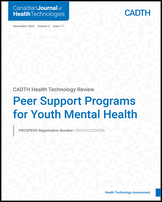|
Stigma stress
Post-intervention: 84 (1 RCT
50
)
Longest follow-up: 117 (2 RCTs
40
,
50
)
| Two RCTs,39,40,50 all with high risk of bias (unclear direction) reported on stigma stress. Participants had a mean age of 1550 to 2139,40 years, most of them female individuals (69.3%50 to 82.2%39,40). The reported mental health concerns across the trials were depression (59.1%50 to 85.5%39) and anxiety (17.3%50 to 69.2%39). The peer support interventions were HOP50 and HOP-C39,40 programs, comparing to treatment as usual50 or waitlist controls.39,40 Outcomes were measured at post-intervention, and at follow-up (6 weeks50 or 2 months40 after core sessions), using the outcome calculated as perceived harm minus perceived resources form the Stigma Stress Scale. Higher scores (range –6 to 6) indicate increased stigma-related stress. At the post-intervention and post-booster follow-ups of the HOP-C trial,39 stigma stress was not calculated, rather the results of the subscale scores were reported separately. At post-intervention, results from 1 RCT (Mulfinger et al.50) suggested that peer support may be favoured compared to TAU.in lowering the stress related to self-stigma. Mean between-group difference for change from baseline to post-intervention was –2.06 (95% CI –2.70 to –1.42)50 At the longest follow-up, the evidence was heterogenous (2 RCTs40,50;6 weeks50 or 2 months40). The Conley et al. trial (reported in Hundert et al.)40 found little to no difference in the effect of peer support intervention (HOP-C) in reducing stigma-related stress, whereas the results from the Mulfinger et al. trial50 favoured peer support. At 6 weeks follow-up, the mean differences for change from baseline in the HOP group was 2.19 units lower than the TAU group (95% CI –2.89 to –1.43). |
Very low
due to serious concerns for risk of bias, inconsistency, indirectness, and imprecision.a,b
| Formal peer support may be favoured vs. TAU with respect to stigma stress at post-intervention, but the evidence is very uncertain. The findings for effect of formal peer support vs. control (waitlist or TAU) on stigma stress at the longest follow-up are inconsistent, and the evidence is very uncertain. |
